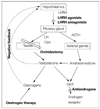Abstract
The hormonal sensitivity of prostate cancer has been exploited clinically since Huggins and Hodges established the suppressive effects of castration on prostate cancer. Despite over sixty years of research into alternate modalities, androgen deprivation therapy (ADT) has become the mainstay treatment for locally advanced and metastatic prostate cancer. Suppression of testosterone production, the primary goal of hormonal therapy, can be achieved by a multitude of treatments. The ideal timing, duration and composition of ADT remains undefined. At the present time, first-line therapy consists of orchiectomy, luteinizing hormone-releasing hormone (LHRH) analogues or complete androgen blockade (CAB). However, new combinations and treatment settings show promise for improving outcomes and decreasing toxicity. This article provides an overview of the hormonal therapies currently used in advanced prostate cancer.
Figures and Tables
 | Figure 1LHRH : luteinising hormone-releasing hormone, LH : luteinising hormone, FSH : follicle-stimulating hormone, ACTH : adrenocorticotrophic hormone, DHT : dihydrotestosterone |
References
1. Gheiler EL, Tiguert R. Current concepts in androgen deprivation therapy-is there a "best" endocrine treatment? World J Urol. 2000. 18:190–193.

2. Mcleod DG. Hormonal therapy:historical perspective to future directions. Urology. 2003. 61:Suppl. 3–7.

3. Higano CS. Side effects of androgen deprivation therapy: monitoring and minimizing toxicity. Urology. 2003. 61:Suppl. 32–38.

4. Laufer M, Denmeade SR, Sinibaldi VJ, Carducci MA, Eisenberger MA. Complete androgen blockade for prostate cancer: what went wrong? J Urol. 2000. 164:3–9.

5. OH WK. Secondary hormonal therapies in the treatment of prostate cancer. Urology. 2002. 60:Suppl. 87–93.





 PDF
PDF ePub
ePub Citation
Citation Print
Print




 XML Download
XML Download